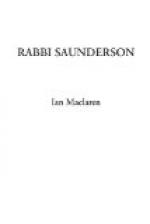Kate had seen various curious hospitals in her day, and had nursed many sick men—like the brave girl she was—but the Rabbi’s room was something quite new. His favourite books had been gathering there for years, and now lined two walls and overhung the bed after a very perilous fashion and had dispossessed the looking-glass—which had become a nomad and was at present resting insecurely on John Owen—and stood in banks round the bed. During his few days of illness the Rabbi had accumulated so many volumes round him that he lay in a kind of tunnel, arched over, as it were, with literature. He had been reading Calvin’s Commentary on the Psalms, in Latin, and it still lay open at the 88th, the saddest of all songs in the Psalter; but as he grew weaker the heavy folio had slid forward, and he seemed to be feeling for it. Although Kate spoke to him by name, he did not know any one was in the room. “Lord, why castest Thou off my soul? . . . I suffer Thy terror, I am distracted . . . fierce wrath goeth over me . . . lover and friend hast Thou put far from me . . . friend far from me.”
His head fell on his breast, his breath was short and rapid, and he coughed every few seconds.
“My friend far from me. . . .”
At the sorrow in his voice and the thing which he said the tears came to Kate’s eyes, and she went forward and spoke to him very gently. “Do you know me, Dr. Saunderson—Miss Carnegie?”
“Not Saunderson . . . Magor Missabib.”
“Rabbi, Rabbi”—so much Carmichael had told her; and now Kate stroked the bent white head. “Your friend, Mister Carmichael—”
“Yes, yes”—he now looked up and spoke eagerly—“John Carmichael, of Drumtochty . . . my friend in my old age . . . and others . . . my boys . . . but John has left me . . . he would not speak to me . . . I am alone now . . . he did not understand . . . mine acquaintance into darkness . . . here we see in a glass darkly . . .” (he turned aside to expound the Greek word for darkly), “but some day . . . face to face.” And twice he said it, with an indescribable sweetness, “face to face.”
Kate hurriedly removed the books from the bed and wrapt round his shoulders the old gray plaid that had eked out his covering at night, and then she went downstairs.
“Bring,” she said to Barbara, “hot water, soap, towels, and a sponge to Dr. Saunderson’s bedroom, immediately.”
“And gin a’ dinna?” inquired Barbara aggressively.
“I’ll shoot you where you stand.”
Barbara shows to her cronies how Miss Carnegie drew a pistol from her pocket at this point and held it to her head, and how at every turn the pistol was again in evidence; sometimes a dagger is thrown in, but that is only late in the evening when Barbara is under the influence of tonics. Kate herself admits that if she had had her little revolver with her she might have been tempted to outline the housekeeper’s face on the wall, and she still thinks her threat an inspiration.




